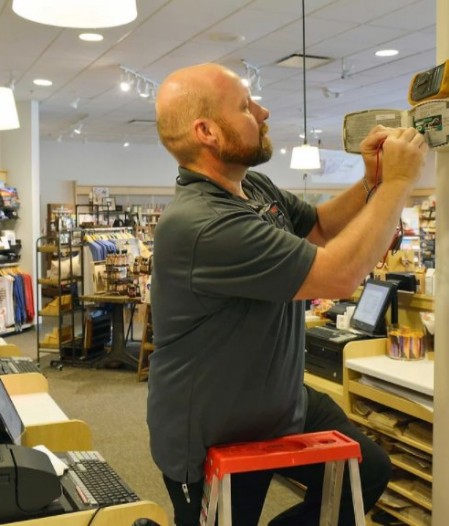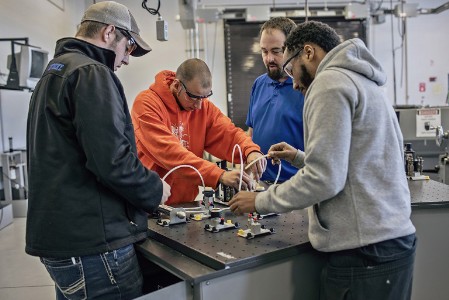Program Description: Facility Engineering Technician
Job Titles that use this skill or training: Facility Engineering Tech, Facility Engineer, Facility Manager, etc.
The Facilities Engineering Technician (commercial and industrial) program will provide students with a variety of skills necessary to seek entry level employment in plants, hospitals, hotels, apartment complexes, shopping centers, and government buildings. A graduate of this program will have learned maintenance and repair of walls, floors, plumbing, basic carpentry, doors, ceilings, basic electrical, lighting, basic air conditioning and heating systems, building framework and structure, machine maintenance, grounds keeping, and physical plant operations.




$350 monthly tuition
with our grant program
This is a Diploma Program
Conveniently Offered In On-Campus, Hybrid Or Online Formats with Hands-On Learning.
Our Diploma Programs are designed focus on specific skills for career-readiness. Diploma programs are a collection of short courses of study (a curriculum), that when completed provide your the credentials through specific education and training for the job opportunities, career, or job advancement you want.
Our Diploma Programs are cost-effective; they cost less than a 4 year university degree and do not include coursework that is not specific to the training you need. You don't have to worry about prerequisites or other complicated enrollment procedures you may find with a degree program. Class schedules are often flexible as most attendees are working professionals.
Diploma Programs have fewer subjects to study which allows the working students to take up part-time diploma courses. A diploma program is not too stressful and demanding.
7 Reasons to choose a Diploma over a Degree
1. Diplomas make you job-ready, faster
Many university degrees will focus on theory-based knowledge that may not guarantee you the career or position you want. Vocational education gives you the opportunity to understand the skills you need while allowing you to put these skills into practice while you study. Once you are qualified, you will feel confident to apply your knowledge and capabilities in an interview and on the job.
2. You are more likely to be hired and valued
There is currently a shortage of vocational workers in a range of sectors. The skill shortage in Australia ensures that what you learn from completing a diploma is highly valuable to employers. Recent research has proven that 78% of VET graduates are employed after training and were able to find work after their studies exceeded the number of jobs found by Bachelor degree graduates.
3. You will potentially earn more from the beginning
On average, people with a career college diplomas in medical and engineering are earning $3,200 more than Bachelor degrees graduate in their first year out of study. A 2017 report cites that the median full-time income for a VET graduate is $56,000. Whereas, the median graduate salary for students completing a bachelor’s degree is $54,000.1 Often VET graduates can earn higher salaries than many bachelor’s degree graduates.
4. Diplomas can be completed in significantly less time
University degrees require a minimum of three years of full-time study, while diplomas need only one year at the very most. Most diplomas can be completed within a year or much less. Due to the practical nature of diplomas, the amount of time you spend learning and completing assignments will be greatly lessened, allowing you to enter the workforce and reap the benefits sooner.
5. Diplomas are a fraction of the cost and provide better value for money
Undergraduate degrees can cost upwards of $15,000 in course fee alone, whereas diplomas can cost less than half, or a third of that price. In addition, just like university degrees, the government offers some fee help schemes for people who undertake courses for a diploma. Your diploma course provider can assist you to see if you are eligible.
6. Diplomas often have fewer rigid pre-requisites and more people like you
Particularly for high-school graduates, universities do look for specific ACT scores and there is a competitive application process for acceptance into their limited-seats courses. Vocational courses are less reliant on these scores, giving you a better chance of being accepted into the course of your choice. When courses are conducted online, there is no limit on the number of students. If you are older, you will find more of your peers in chat rooms and learning forums when you undertake a diploma.
7. Learning is flexible
The best vocational education courses can be started at any time of the year because unlike degrees, they don’t have to follow a higher education calendar. Many diploma and certification courses can be taken online so you can to finish a diploma part-time while you work. You might need to consider the opportunity cost of waiting for the next degree intake and missing out of a pending opportunity that requires a respected qualification. If timing or other flexibility is a factor, then a diploma is a smart and accessible choice.
With the right qualifications, you’ll be able to plan your career choices and utilise your skills. In many cases, a diploma is the best answer: it comes at a fraction of the cost, time and effort, and equips you with better practical skills and confidence for your new career.
Why complete a Diploma Program?
When completing a job application, applying for a job, or working towards a promotion on an existing job, it's necessary to list specifically what are your qualifications or job SKILLS. Completing a skills training course can qualify you for that job or promotion.
When applying for a job and in an interview you are asked "What can you do?" What would your answer be?
Our Skills Training Courses provide you with a specific skill that you can answer that question with. OurDiploma Programs can help you get a specific job you are looking for because you have the specific skills and training to do that job.